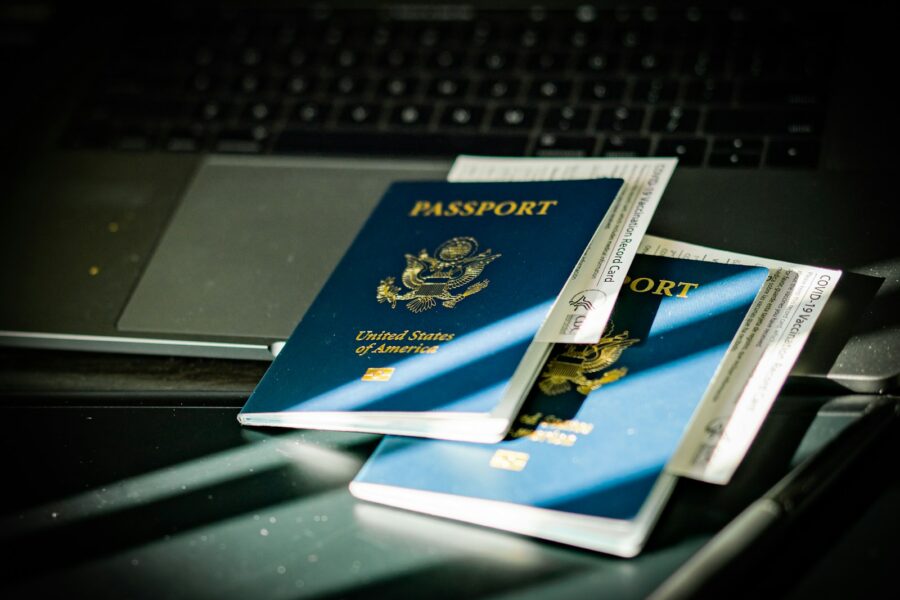Tying the knot with someone from another country? You’ll need to get familiar with an affidavit of support for marriage. It’s a crucial document that proves you can financially support your spouse, ensuring they won’t rely on public funds after moving to the US.
Understanding the affidavit of support is key to helping your partner secure a green card. You’re not just pledging your love, but also y

Guide to Marriage Visa Support Affidavits
Tying the knot with someone from another country? You’ll need to get familiar with an affidavit of support for marriage. It’s a crucial document that proves you can financially support your spouse, ensuring they won’t rely on public funds after moving to the US.
Understanding the affidavit of support is key to helping your partner secure a green card. You’re not just pledging your love, but also your financial backing. Let’s dive into what this commitment means for your future together.
What is an Affidavit of Support?
When you invite a partner from overseas to join you in the US, you’re required to sign an Affidavit of Support. This legally binding document acts as a guarantee to the US government that your spouse won’t become a public charge and that you have the means to support them financially.
The form, officially known as Form I-864, plays a pivotal role in the immigration process. It’s your formal pledge of financial responsibility, where you promise to provide support at an income level that is at or above 125% of the US poverty line.
- Ensure you meet the income requirements
- Gather the necessary financial documents
- Complete Form I-864 accurately
By signing this affidavit, you understand that the government can hold you accountable if your spouse receives any means-tested public benefits. That means you could be liable for repaying the cost of benefits such as food stamps or Medicaid.
To be eligible to be a sponsor, you must:
- Be a US citizen or lawful permanent resident
- Be 18 years of age or older
- Have your primary domicile in the US or a US territory
This document solidifies the seriousness of your commitment not just to your partner, but also to the US itself. It shows immigration officials that you’re ready and able to support your partner financially, ensuring they can settle into their new country without financial hardship or reliance on government aid.
Remember, the Affidavit of Support is more than a formality—it’s a binding contract between you, your spouse, and the US government. Take the time to review your financial situation and understand the commitment before you sign on the dotted line. Your efforts here underscore the gravity and the depth of your commitment to both your spouse’s well-being and their integration into American society.
Why is an Affidavit of Support required for a marriage-based visa?
The United States takes measures to ensure that those entering the country through marriage are not going to become a financial liability. This is where the Affidavit of Support comes into play, an essential step in the marriage-based visa process.
Understanding the Purpose of an Affidavit of Support
An Affidavit of Support assures the U.S. government that a visa applicant has financial backing and is unlikely to rely on government assistance programs. In the realm of immigration, this document serves as a formal pledge by you, the sponsor, to support your spouse financially. This is crucial because it reflects the United States’ concerns over immigrant self-sufficiency. When you stand as a sponsor, you’re stating that your spouse will not need to turn to government-funded resources. This document is the government’s way of reducing the potential financial burden on the country’s social service programs.
The form acts as a safeguard against abuse of public funds and shows that your spouse’s transition into the U.S. will not only be grounded in a stable relationship but also in economic stability. It’s imperative to ensure that your spouse has a level of financial assurance that precludes the need for welfare or other means-tested public benefits.
The Financial Responsibilities of the Sponsor
Your role as a sponsor carries long-term financial obligations that you must be fully aware of. By signing the Affidavit of Support, you are legally agreeing to provide for your spouse’s basic living expenses, such as:
- Food
- Clothing
- Shelter
- Medical care
Your financial responsibilities begin the moment your spouse becomes a permanent resident and continue until they:
- Become a U.S. citizen,
- Can be credited with 40 quarters of work (usually 10 years),
- Are no longer an immigrant, or
- Pass away.
It’s crucial to understand that, if you fail to support your spouse and they receive public benefits, the government has the right to ask you to repay that cost. This legal contract has teeth, and federal law permits the enforcement of this repayment if necessary. Therefore, before signing, thoroughly assess your financial health and be certain you’re willing and able to fulfill this commitment. Without wavering, this pledge underscores the seriousness of sponsoring an immigrant spouse and mirrors the U.S. commitment to maintaining the integrity of its immigration system.
How to prepare an Affidavit of Support for a marriage-based visa application?
Gathering the Necessary Documents
To start preparing your Affidavit of Support, you’ll need to collect various documents to prove your financial stability. This includes your most recent federal income tax return, including W-2s or 1099 forms, and your pay stubs from the current year to show your income is consistent and meets the necessary thresholds. You must also have proof of your U.S. citizenship or lawful permanent resident status, such as a passport or green card. Keep all your financial records organized and easily accessible; these are critical in demonstrating you’re well-prepared to assume the financial responsibilities required by immigration.
Filling Out Form I-864, Affidavit of Support
When filling out Form I-864, the Affidavit of Support, accuracy is paramount. You’re required to provide comprehensive information about your employment history and your income. Don’t rush through this step; incorrect or incomplete forms may result in delays in your spouse’s visa processing. If you struggle with the details, consider seeking guidance from an immigration attorney or a trusted advisor who is familiar with the process. They can help you navigate the complexities of the form, ensuring that every piece of information is precise and complies with immigration requirements.
Providing Proof of Financial Ability
Once your documents are in order, you’ll need to present convincing proof of your financial ability. This isn’t just about showing earnings above the poverty line; you must also be prepared to demonstrate the sustainability of your income. Solid evidence can include letters from your employer confirming your employment status and salary, bank statements, and assets such as property ownership or investments. Remember, immigration officials will scrutinize this information to determine if you can genuinely support your spouse without relying on public benefits. Your documentation must unequivocally showcase your capacity to fulfill the financial obligations of sponsoring your spouse.
Common mistakes to avoid when preparing an Affidavit of Support
Incomplete or Inaccurate Information
When you’re dealing with immigration processes, providing complete and accurate information on Form I-864 is non-negotiable. Overlooking details or submitting incorrect data can lead to significant setbacks. Ensure every personal detail matches the information on your official documents. Double-check entries for your address, date of birth, and Social Security number. Also, review the beneficiary’s particulars thoroughly to avoid miscommunication and processing hiccups.
Insufficient Evidence of Financial Ability
Proving your financial capability is a pivotal component of the Affidavit of Support. Submitting clear evidence is key. Include recent pay stubs, a stable employment history, or investment income documents to bolster your case. Include a letter from your employer stating your position, the length of your employment, and your salary. If you’re self-employed, provide business records and tax filings. Also, pulling together documents such as property deeds or appraisal reports can enhance your financial profile.
Failure to Meet the Income Requirements
To successfully sponsor your spouse, you must meet or exceed the 125% income threshold of the Federal Poverty Guidelines for your household size. This ensures that you won’t rely on public benefits to support your spouse. If your income falls short, consider including assets to make up the difference. This can include savings, stocks, bonds, or real estate. Note down every asset accurately and obtain professional appraisals where necessary to validate their value. Should you need a joint sponsor, choose someone who meets these requirements and understands the responsibilities involved.
Remember, meticulous preparation and adherence to the guidelines will facilitate a smoother immigration journey for you and your spouse.
What happens after submitting the Affidavit of Support?
Reviewing the Affidavit of Support by the Immigration Authorities
Once you’ve submitted your Affidavit of Support, immigration authorities begin a detail-oriented review. This process involves scrutinizing the information you’ve provided to ensure it meets the legal requirements for a marriage-based visa. The U.S. Citizenship and Immigration Services (USCIS) will cross-reference your financial details with tax returns, employment information, and other relevant supporting documents. They’re assessing your financial stability and your ability to support the beneficiary.
Accuracy and completeness are the cornerstones of this stage. Any discrepancy between your documents and the details on Form I-864 could trigger further inquiry. It’s essential you’re forthcoming with all the necessary information right from the start.
Request for Additional Evidence or Clarification
If the USCIS officers find gaps or inconsistencies in your submission, they’ll issue a Request for Evidence (RFE). This isn’t a denial, but it’s crucial to respond promptly and thoroughly. An RFE may ask for clarification about:
- Your employment status
- Additional tax documents
- Proof of assets, if you’ve included them to meet the income requirement
Your response time is limited, and failure to submit the requested evidence can result in a delay or denial of the visa application. Handle an RFE with the same attention to detail as the initial affidavit to avoid unnecessary complications.
Approval of the Affidavit of Support
When all your ducks are in a row, and the USCIS verifies that your Affidavit of Support meets all requirements, they’ll approve it. Approval signifies that you’ve provided sufficient evidence of your ability to financially support the visa applicant. Keep in mind that approval doesn’t guarantee visa issuance; it’s merely one of the necessary steps in the overall process. The visa applicant still needs to meet all other eligibility criteria under U.S. immigration law.
Upon approval, your role as a sponsor becomes legally binding once the intending immigrant becomes a lawful permanent resident. Your financial responsibilities continue until the sponsored individual becomes a U.S. citizen, can be credited with 40 quarters of work, leaves the United States permanently, or passes away. It’s a long-term commitment, highlighting the importance of understanding your responsibilities before submitting the affidavit.
Conclusion
Navigating the affidavit of support for your marriage-based visa is a critical step in uniting with your partner. Remember, attention to detail and prompt responses to any RFEs can make the difference in your application’s success. While approval of your affidavit reflects your financial readiness, it’s just part of the journey toward visa issuance. Stay informed and prepared to fulfill your sponsorship duties long-term. Your commitment now lays the groundwork for a smoother path ahead.



Leave a Comment